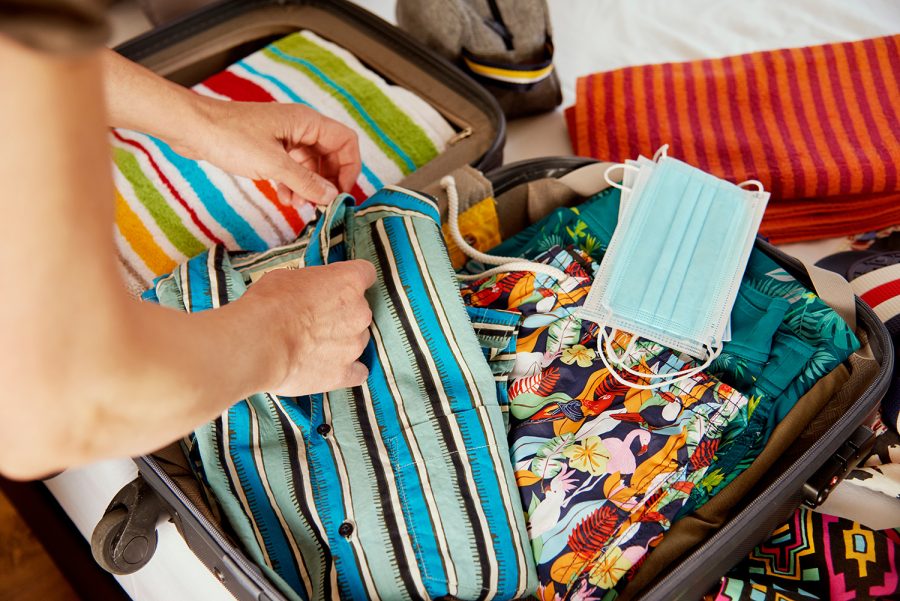Opinion | COVID-19 hygiene is essential after spring break travel
It will take a group effort to keep immunocompromised Iowans safe during and after spring break.
March 9, 2022
Reportedly unable to require vaccinations or masks for in-person classes, the University of Iowa has done little to support immunocompromised students during the 2021-2022 school year.
Immunocompromised students shouldn’t be the only ones carrying the burden of maintaining an environment they can safely coexist in. Traveling students must remain mindful of mask use and sanitization to keep everyone well.
The UI’s spring break falls on March 14-19. This is the first spring break scheduled since the 2019-2020 academic year.
While Iowa City has a great blend of city and small town, it is a less-than-ideal dream spring break destination. It’s a safe bet that with airlines running pre-COVID-19 numbers of flights and travel restrictions lifted in many U.S. states, many UI students will partake in the usual flock to the beaches of Florida, California, and other warmer locations next week.
While some consider “the worst of the coronavirus pandemic” to be over, not everyone feels at ease with the recently lessened restrictions.
Don’t get me wrong. I am delighted vaccines are available to make close to pre-pandemic lifestyles safe.
Mask mandates are quickly being lifted across the country. On Tuesday, Hawaii became the last U.S. state to announce it would lift its mask mandate.
The Iowa City mask mandate, instated by Mayor Bruce Teague in 2020 and again in August 2021, and maintained even amid conflicting state guidelines, was lifted on March 1.
According to the UI COVID-19 FAQ page, UI staff and students are strongly discouraged from asking or commenting on someone’s choice to wear or not wear a mask. Masks are now “not required, but welcome,” according to the UI website.
Existing in Iowa City without everyone wearing masks still poses a large risk to some immunocompromised people. When people begin to travel, presumably not wearing masks on their vacations as well, the amount of contact could pose lethal danger to those back home.
The Centers for Disease Control and Prevention described those at increased risk for severe reactions to COVID-19 as anyone who is immunocompromised or has a history of cancer, chronic kidney, liver, or lung disease, or diabetes, among others.
In 2021, reporter Sara Berg for the American Medical Association wrote that 7 million people, or 2.7 percent of all adults in the U.S., are immunocompromised. If we apply this same percentage to the UI population of 32,535 undergraduate, graduate, and professional students as recorded by the UI Office of Admissions, there are approximately 650 immunocompromised students on campus.
Throughout all the polarization that has existed these past two years in both politics and culture, most seem to agree on one sentiment. We’re all tired. We need a break. We need some peace.
As one immunocompromised student, I hope everyone enjoys their well-deserved upcoming breaks. Whether this week will be spent at home — a “stay-cation” some might say — or on a sunny beach half a country away, this list of spring break tips from the CDC has important guidance for staying safe.
While this list didn’t contain anything shocking or unheard of, it was a nice reminder.
- Wash and sanitize your hands often.
- Wear a mask if you feel ill or have recently traveled to high population areas.
- Avoid coughing or sneezing into the palm of your hand.
- Get vaccinated if you are able.
Everyone is welcome to wear a mask or not. Unfortunately, this doesn’t create safe conditions for chronically ill people when high travel is added to an environment.
Giving everyone the respect and ability to make the choice whether or not to be exposed to illness could further progress making our way past the pandemic. More importantly, remembering and minding the CDC’s travel tips could save a life.
Columns reflect the opinions of the authors and are not necessarily those of the Editorial Board, The Daily Iowan, or other organizations in which the author may be involved.



